Prologue
A tavern in a German city, not far from the opera house. The spirits of beer and wine eagerly await visitors to the wine-cellar. The muse of Hoffmann the poet appears. She is determined to save him from his succession of disappointments in affairs of the heart: at the theatre, Hoffmann has only just seen his former lover, the opera singer Stella, and she is intent on resuming their romance. To save Hoffmann, the muse adopts the guise of his friend Nicklausse. The councillor Lindorf appears – he is Hoffmann's rival. He intends the poet great harm and seizes a love letter from Stella. Tonight she is to sing the role of Donna Anna in Mozart's opera Don Giovanni and wait for Hoffmann in her rooms after the performance. During the interval the tavern becomes filled with students. They ask Hoffmann to sing them a song about the little Zach, who is referred to as Kleinzach ("Il était une fois à la cour d’Eisenach" ("Once upon a time at the court of Eisenach")). In the middle of the song, Hoffmann unexpectedly succumbs to a reverie about Stella. The soiree becomes increasingly debauched, and Hoffmann has a skirmish with Lindorf. They all begin to talk about love, and the poet offers his drinking companions the story of his own amorous adventures.
Act I
The inventor Spalanzani is admiring his brainchild – the doll Olympia, amazingly similar to a real person. She promises to be highly profitable, and Spalanzani fears that Coppélius, a salesman of medical apparatus, will demand a share of the proceeds as he has manufactured the doll's eyes. Hoffmann, thinking that Olympia is a real girl, has fallen in love with her and, in order to be closer to the object of his desire, has become Spalanzani's apprentice. In vain does Nicklausse attempt to warn Hoffmann: love has made the latter blind. The charlatan trader Coppélius appears; he sells the poet glasses enabling the wearer to see only that which he wishes to see. Afraid that Coppélius will claim a fee for the doll, Spalanzani offers him a bank cheque in payment.
The guests assemble, and the inventor presents Olympia to them; all are enamoured of her beauty, Hoffmann more so than anyone else. Olympia sings some couplets ("Les oiseaux dans la charmille" ("The birds in the arbour")), Spalanzani winding up the mechanism from time to time. The guests leave to dine, and Hoffmann declares his love to Olympia. Coppélius appears once again. He is enraged: the bank cheque given to him is fraudulent. The guests return and the dancing begins. The elated Hoffmann dances with Olympia, but in anger Coppélius smashes the doll. Ridiculed by the assembly, in horror the poet realises his mistake.
Act II
Munich, at the remote house of Crespel the violin-maker and his young daughter Antonia. Antonia loves to sing more than anything else, though Crespel forbids his daughter this activity: singing could cost her her life. Crespel is a widower – his wife, a famous opera singer, died from an illness. This illness – as well as a gift for music – has been inherited by Antonia. Despite being forbidden, the girl sings a romance ("Elle a fui, la tourterelle!" ("She fled, the dove!"). Crespel reproaches her and, having tasked his manservant Frantz with locking all the doors, goes out.
Hoffmann appears – he is in love with Antonia. He is happy: the girl requites his love. The young people sing a favourite song as a duet. They intend to be married, and for the sake of familial happiness Antonia agrees to give up singing. Hearing Crespel's footsteps draw near, Hoffmann hides. Dr Miracle appears – he wishes to see Antonia dead by compelling her to sing. Crespel tries to get rid of the murderous doctor, but the latter, left alone with the girl, tempts her all the more. He draws Antonia into a fiendish snare, speaking to her in her late mother's voice and words. Submitting to dreams of the stage and renown, Antonia renounces her promise to Hoffmann, sings in ecstasy and dies.
Act III
Venice, at the lavish palazzo of the courtesan Giulietta. Hoffmann hears the song of Giuletta and Nicklausse; it is a barcarolle ("Belle nuit, ô nuit d’amour" ("Beautiful night, oh night of love"). Giulietta is a perfidious beauty, stealing the souls of her lovers and presenting them to the evil sorcerer Dapertutto. One of the courtesan's admirers, Schlémil, has already lost his own shadow because of her. Now Dapertutto wishes to gain possession of Hoffmann's soul and promises Giulietta a diamond if she can obtain the poet's reflection ("Scintille diamant" ("Sparkle, diamond"). Hoffmann joins Giulietta's guests and sits down with them at the card table. The courtesan seduces the poet and, feigning to be in love, persuades Hoffmann to give her his mirror image, as if for a keepsake. Schlémil appears with the key to Giulietta's rooms. The –rivals conduct a duel, and Schlémil falls by Hoffmann's hand. The poet grasps the key, but only sees the deceitful woman sailing off on a gondola with her next lover, Pitichinaccio the dwarf. Only Nicklausse's assistance helps Hoffmann evade the police.
Epilogue
In the tavern, the students continue to drink and make merry. Stella arrives, but Hoffmann barely recognises her. The prima donna leaves the tavern on Lindorf's arm. Nicklausse appears as the muse once more and comforts the poet.
Prologue
A tavern in Nuremberg: The Muse appears and reveals to the audience her purpose is to draw Hoffmann's attention, and make him abjure all other loves, so he can be devoted to her: poetry. She takes the appearance of Hoffmann's closest friend, Nicklausse. The prima donna Stella, performing Mozart's Don Giovanni, sends a letter to Hoffmann, requesting a meeting in her dressing room after the performance. The letter and the key to the room are intercepted by Councillor Lindorf ("Dans les rôles d'amoureux langoureux" – In the languid lovers' roles), the first of the opera's incarnations of evil, Hoffmann's nemesis. Lindorf intends to replace Hoffmann at the rendezvous. In the tavern, students wait for Hoffmann. He finally arrives, and entertains them with the legend of Kleinzach the dwarf ("Il était une fois à la cour d'Eisenach" – Once upon a time at the court of Eisenach). Lindorf coaxes Hoffmann into telling the audience about his three great loves.
Act 1 (Olympia)
This act is based on a portion of "Der Sandmann" (The Sandman).
Hoffmann's first love is Olympia, an automaton created by the scientist Spalanzani. Hoffmann falls in love with her, not knowing Olympia is a mechanical doll ("Allons! Courage et confiance...Ah! vivre deux!" – Come on! Courage and confidence ... Ah! to live!). To warn Hoffmann, Nicklausse, possessing the truth about Olympia, sings a story of a mechanical doll with the appearance of a human, but Hoffmann ignores him ("Une poupée aux yeux d'émail" – A doll with enamel eyes). Coppélius, Olympia's co-creator and this act's incarnation of Nemesis, sells Hoffmann magic glasses to make Olympia appear as a real woman ("J'ai des yeux" – I have eyes).
Olympia sings one of the opera's most-famous arias, "Les oiseaux dans la charmille" (The birds in the arbor, nicknamed "The Doll Song"), during which she runs-down and needs to be wound-up before she can continue. Hoffmann is tricked into believing his affections are returned, to the bemusement of Nicklausse, subtly attempting to warn his friend ("Voyez-la sous son éventail" – See her under her fan). While dancing with Olympia, Hoffmann falls on the ground and his glasses break. At the same time, Coppélius appears, tearing Olympia apart to retaliate against Spalanzani after cheating him of his fees. With the crowd ridiculing him, Hoffmann realizes he loved an automaton.
Act 2 (Antonia)
This act is based on "Rath Krespel".
After a long search, Hoffmann finds the house where Crespel and his daughter Antonia are hiding. Hoffmann and Antonia loved each other, but were separated after Crespel decided to hide his daughter from Hoffmann. Antonia inherited her mother's talent for singing, but her father forbids her to sing because of her mysterious illness. Antonia wishes her lover would return to her ("Elle a fui, la tourterelle" – "She fled, the dove"). Her father also forbids her to see Hoffmann, encourages Antonia in her musical career, and therefore, endangers her without knowing it. Crespel tells Frantz, his servant, to stay with his daughter, and after Crespel leaves, Frantz sings a comical song about his talents "Jour et nuit je me mets en quatre" – "Day and night, I quarter my mind."
After Crespel leaves his house, Hoffmann takes advantage of the occasion to sneak in, and the lovers are re-united (love duet: "C'est une chanson d'amour" – "It's a love song"). After Crespel returns, he receives a visit from Dr Miracle, the act's Nemesis, forcing Crespel to let him heal her. Eavesdropping, Hoffmann learns Antonia may die if she sings too much. He returns to her boudoir, and makes her promise to give up her artistic-dreams. Antonia reluctantly accepts her lover's will. After she is alone, Dr Miracle enters Antonia's boudoir to persuade her to sing and follow her mother's path to glory, stating Hoffmann is sacrificing her to his brutishness, and loves her only for her beauty. With mystic powers, he raises a vision of Antonia's dead mother and induces Antonia to sing, causing her death. Crespel arrives just in time to witness his daughter's last breath. Hoffmann enters, and Crespel wants to kill him, thinking he is responsible for his daughter's death. Nicklausse saves his friend from the old man's vengeance.
Act 3 (Giulietta)
This act is loosely-based on Die Abenteuer der Silvester-Nacht (A New Year's Eve Adventure).
Venice. The act opens with the barcarolle "Belle nuit, ô nuit d'amour" – "Beautiful night, oh night of love". Hoffmann falls in love with the courtesan Giulietta, and thinks she returns his affections ("Amis, l'amour tendre et rêveur" – "Friends, tender and dreamy love"). Giulietta is not in love with Hoffmann, but seducing him under the orders of Captain Dapertutto, promising to give her a diamond if she steals Hoffmann's reflection from a mirror ("Scintille, diamant" – "Sparkle, diamond"). The jealous Schlemil (cf. Peter Schlemihl for a literary antecedent), a previous victim of Giulietta and Dapertutto (he gave Giulietta his shadow), challenges the poet to a duel, but is killed. Nicklausse wants to take Hoffmann away from Venice, and goes looking for horses. Meanwhile, Hoffmann meets Giulietta, and cannot resist her ("O Dieu! de quelle ivresse" – "O God! of what intoxication"): he gives her his reflection, only to be abandoned by the courtesan, to Dapertutto's great pleasure. Hoffmann tells Dapertutto his friend Nicklausse will come and save him. Dapertutto prepares a poison to get rid of Nicklausse, but Giulietta drinks it by mistake, dropping dead in the poet's arms.
Epilogue
The tavern in Nuremberg: Hoffmann, drunk, swears he will never love again, and explains Olympia, Antonia, and Giulietta are three facets of the same person, Stella. They represent, respectively, the young girl's, the musician's, and the courtesan's side of the prima donna. After Hoffmann says he doesn't want to love any more, Nicklausse reveals she is the Muse and reclaims Hoffmann: "Be reborn a poet! I love you, Hoffmann! Be mine!" – "Renaîtra un poète! Je t'aime, Hoffmann! Sois à moi!" The magic of poetry reaches Hoffmann as he sings "O Dieu! de quelle ivresse – "O God! of what intoxication" once more, ending with "Muse, whom I love, I am yours!" – "Muse que j'aime, je suis à toi!" At this moment, Stella, tired of waiting for Hoffmann to come to her rendezvous, enters the tavern and finds him drunk. The poet tells her to leave ("Farewell, I will not follow you, phantom, spectre of the past" – "Adieu, je ne vais pas vous suivre, fantôme, spectre du passé"), and Lindorf, waiting in the shadows, comes forth. Nicklausse explains to Stella that Hoffmann does not love her anymore, but Councillor Lindorf is waiting for her. Some students enter the room for more drinking, while Stella and Lindorf leave together.


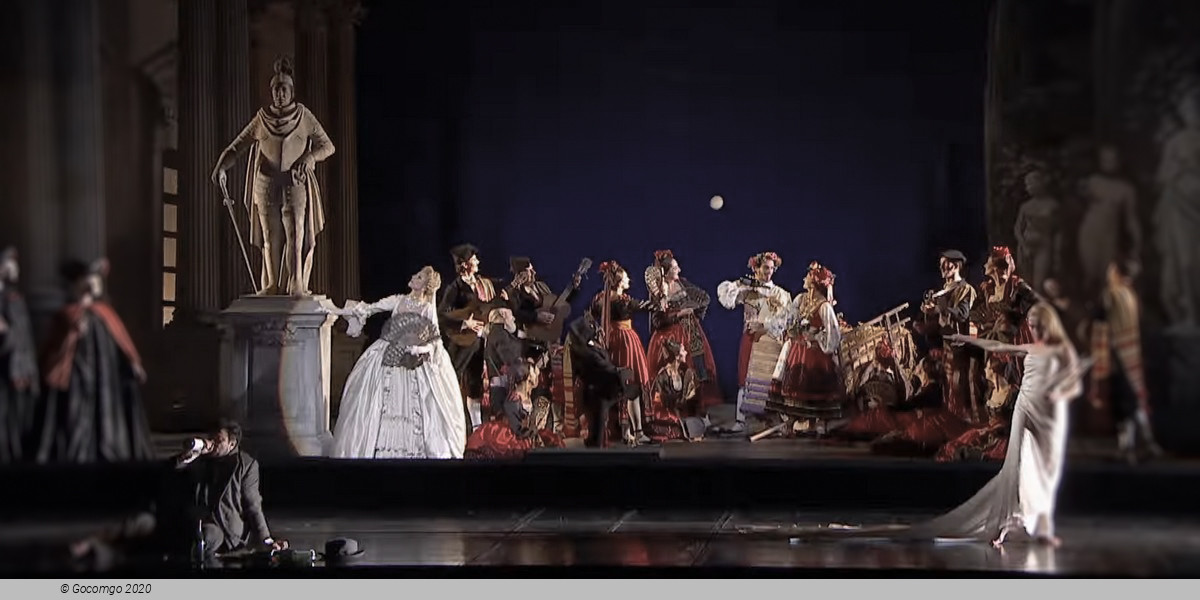
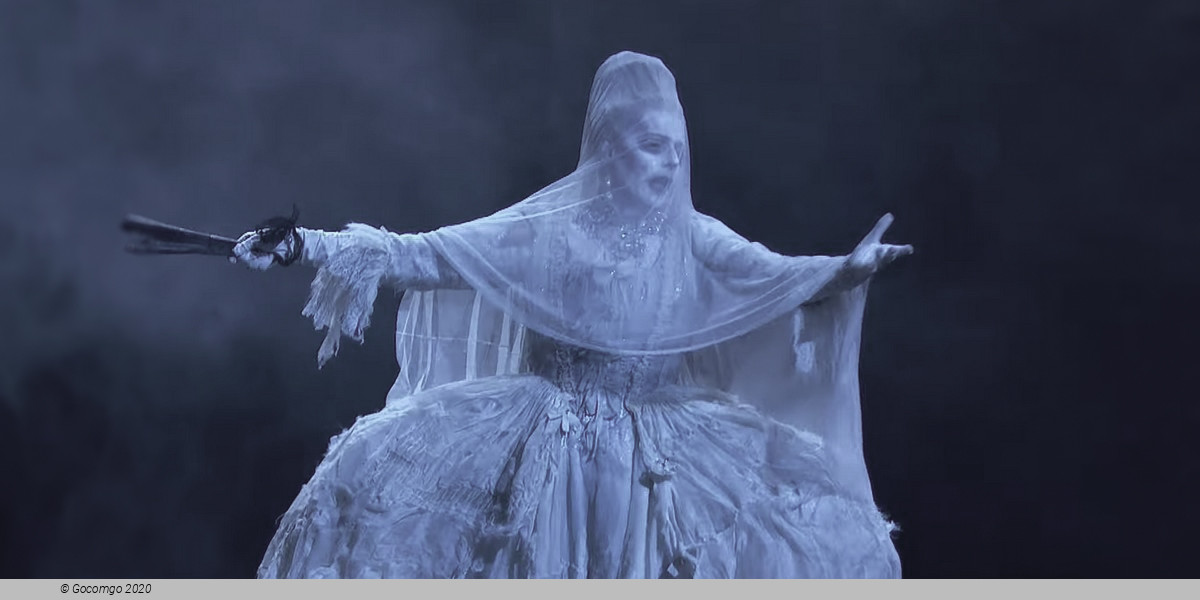
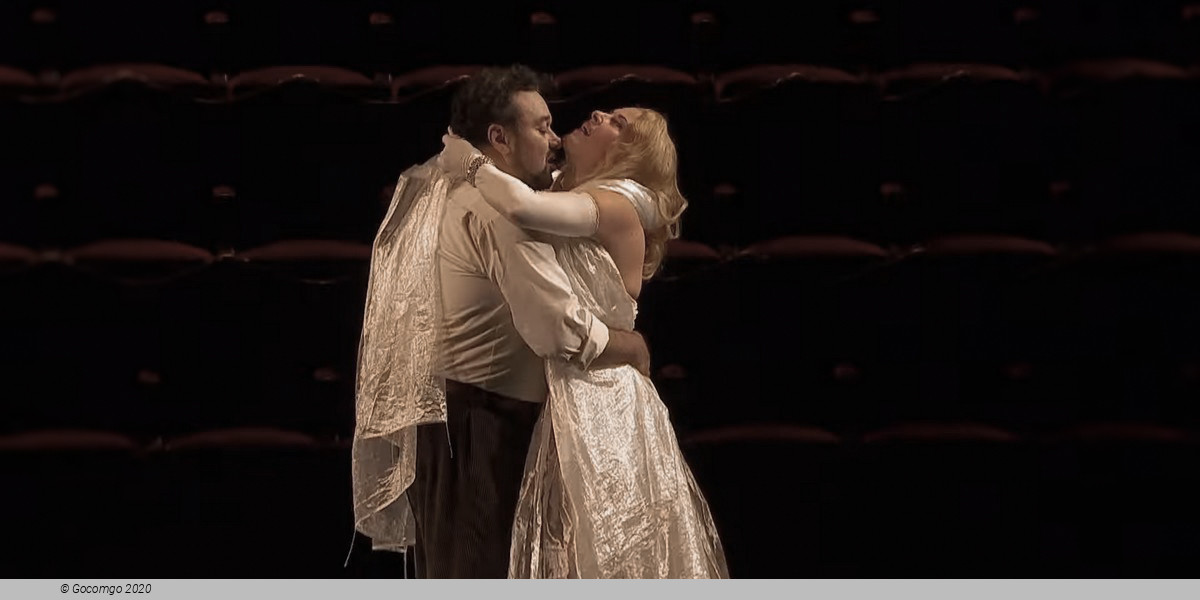
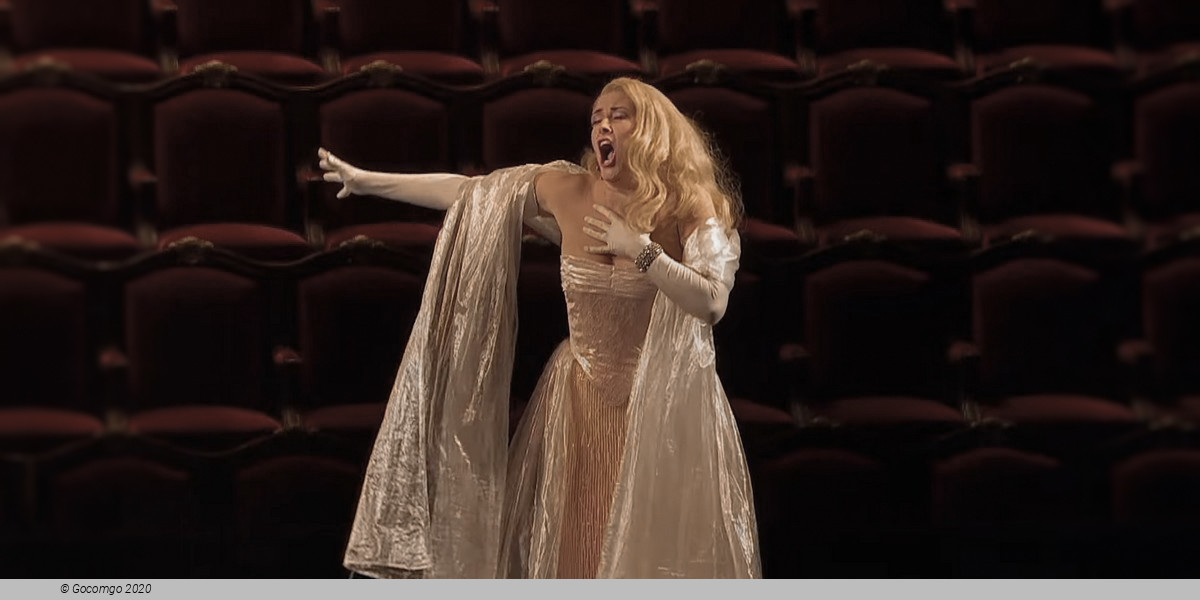
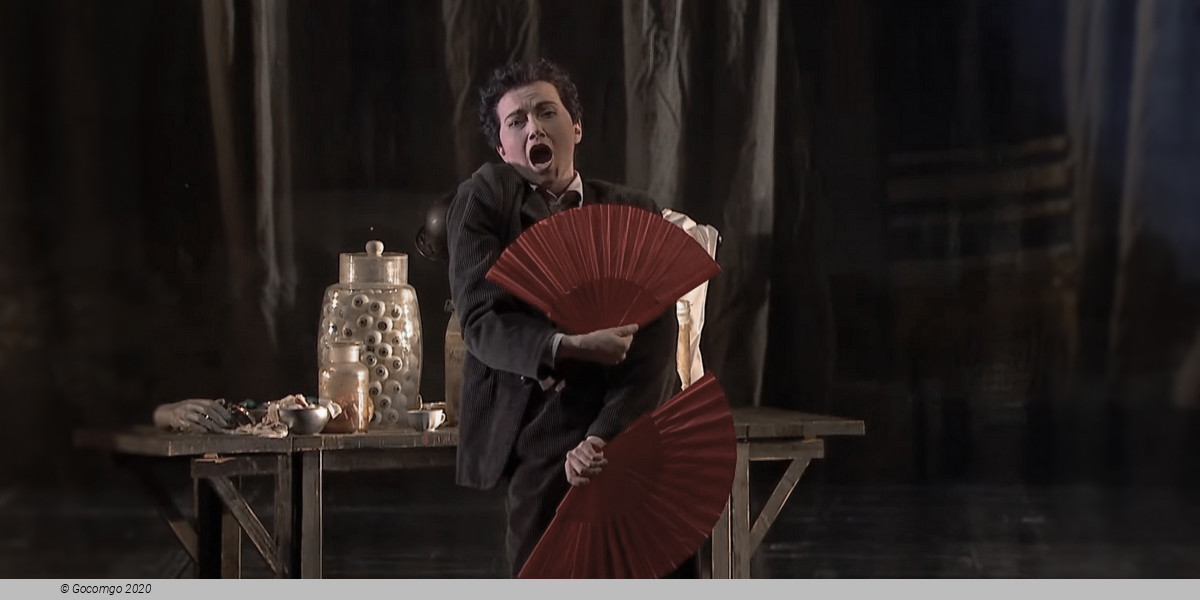
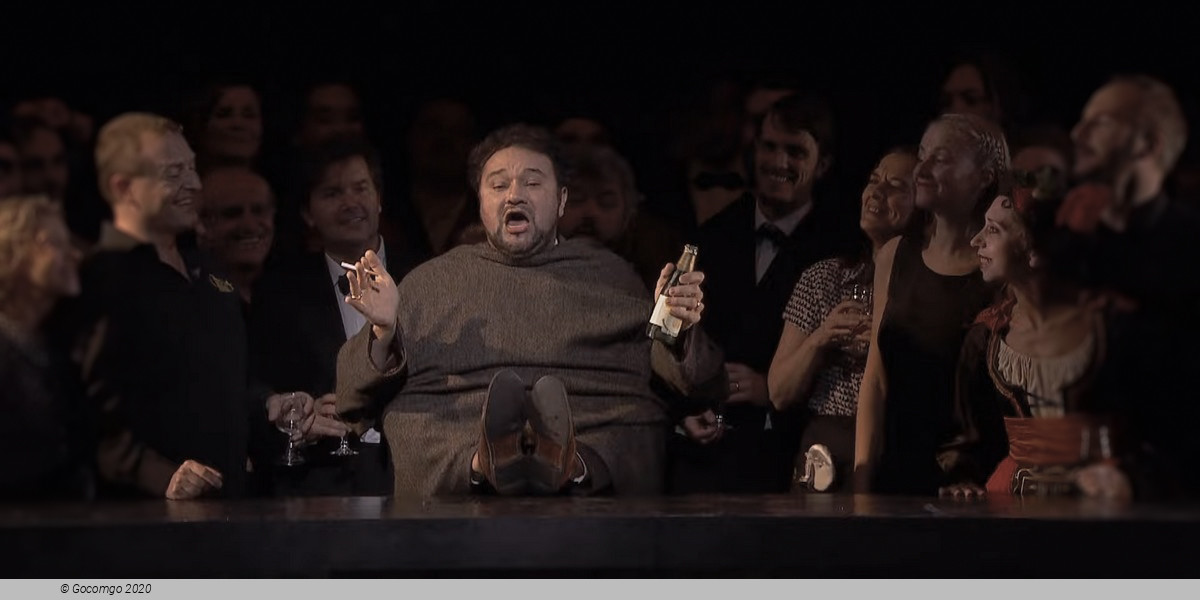
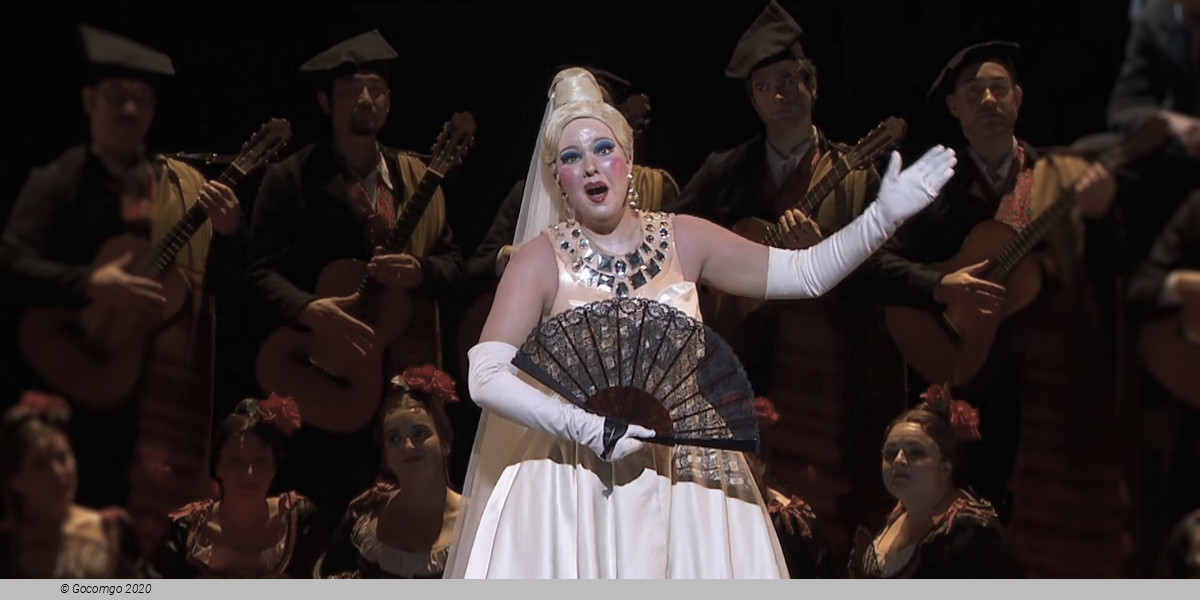
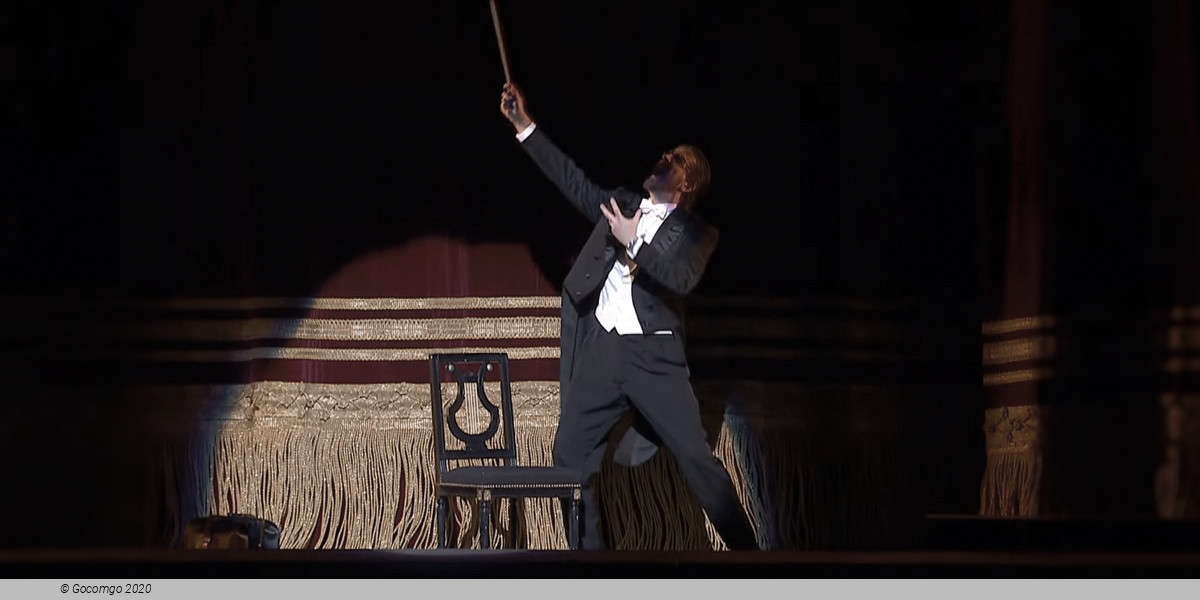
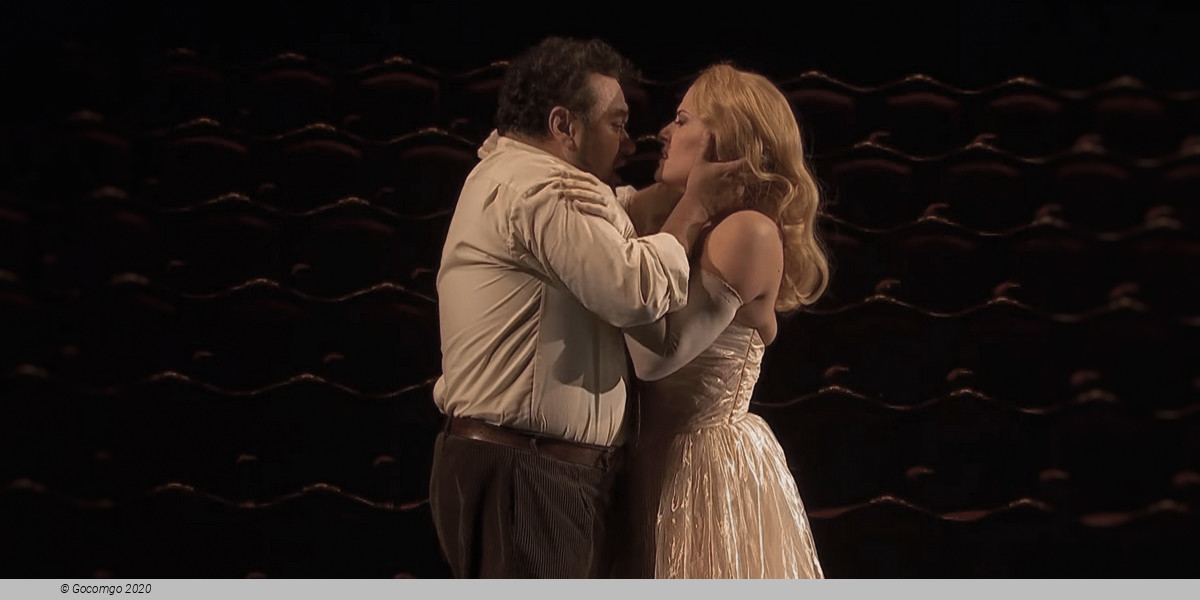
 1 Theatre Square
1 Theatre Square